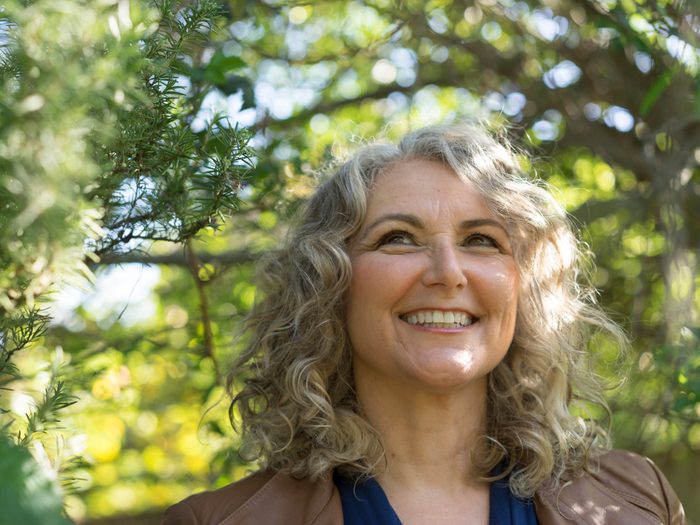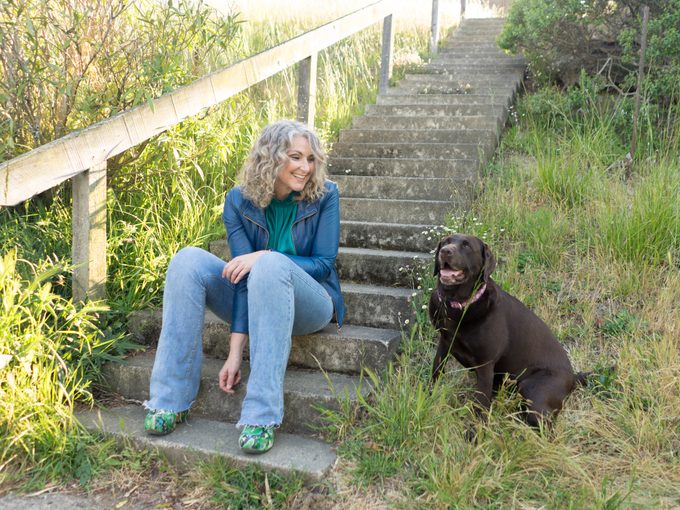Dr. Jen Gunter Sets the Record Straight on Menopause

In her books, her op-eds and her wildly popular Twitter feed, Dr. Jen Gunter helps women around the world separate vagina facts from vagina jade eggs. Now she's setting her sights on that feared and misunderstood time: menopause.
Menopause has long been the punchline to a rambling joke about women’s health. More recently, though, it has become a paycheque, with many companies and practitioners promising magical cures to cash in on our discomfort, anxiety and desperation.
Enter Dr. Jen Gunter. She devotes her social media presence to tackling damaging myths about women’s health and taking down purveyors of “bullshit” solutions—Gwyneth and her vaginal steams very much included. Now the Canadian-born San Francisco-based ob-gyn hopes to make this phase of our lives more manageable, healthy and happy with her new book, The Menopause Manifesto, which delivers history, feminism and stone-cold facts. Those pills, creams and fake tests you’ve been hawked? Time to chuck them in the trash.
(Related: 9 Things You Didn’t Know (And Might Forget) About Perimenopause)
Thank you for writing this book. As someone white-knuckling it through menopause, it was so helpful to read.
Oh, great! Yeah, women need a lot more information.
Do you want women to be dog-earing it and bringing it into their next doctor’s appointment? What’s your hope?
I hope it helps inoculate people against the misinformation online. Lies about hormones and therapies seem to be Instagram and TikTok fodder. I hope this helps people realize what’s a scam, who is scamming them—and who is just woefully misinformed—and what might hurt them. And I hope it helps them have the conversations they need to be having with their health-care providers and be able to push back if they’re not getting the information and help they need.
But where can we get help? Articles about women’s health always blithely say, “Talk to your health-care provider,” but you really only get 15 minutes with your family doctor.
I think it’s impossible to have a conversation about menopause in 15 minutes. It’s not even possible to have it in an hour, because you’re talking about health implications for 40 or 50 years of someone’s life. That’s like saying to a 16-year-old, “We have 15 minutes to talk about your adulthood. Let’s go.” I really think providers need to say, “Listen, I want to help you with your menopause, and I cannot help you all in one visit, so let me give you some basic information, and we’ll have you come back or we can follow up with a phone call, and we can do it over several discussions.” It’s a big concept. And people come in with so much misinformation about hormones. I’ll say, “What do you hope hormones can do for you?” and they’ll come in with this long laundry list of things that sound like, well, life—not menopause.
(Related: What Happens When Doctors Don’t Listen to Patients)
Right, so when someone comes into your office and says, “Hey, I’m sleeping like crap,” it’s important to remember it might not always be menopause-related.
Exactly. Menopause doesn’t happen in a vacuum. When you’re in your late 40s or early 50s, and you might have children in middle school or high school, it’s a stressful time. There’s a lot of other things going on. So many women take care of everybody else except themselves. The three healthiest things a woman can do to help her menopause are not smoke, exercise regularly and eat right. So I always start off with the basics. You can’t look at hormones as a magic wand. They aren’t. They are a piece of the puzzle for some people, though not for everyone. But they’re not the whole picture.
What you said in the book about how exercise is like free money—that was a light bulb for me. I always think, Oh, if I can’t commit to a seven-days-a-week regimen, what’s the point? But every little bit counts! A 10-minute dog walk is great! That’s like 10 free bucks.
Many women are very guilty of this right-or-wrong binary because that’s how this patriarchal society has made us feel—we’re either good girls or bad girls. It’s taken me a long time to move away from that. There are days where there’s too much going on—but if I can only get in 15 minutes on the Peloton, that’s okay. It’s better to do it than not, and the more I just do a little bit, I find, ooh, maybe I can do 20 minutes or maybe 30. And I know a lot of people have difficulty exercising or have physical limitations, but even doing gentle stretching, even balance exercises is always beneficial.

What symptoms are women most likely to seek treatment for?
I think the most bothersome ones are hot flushes and sleep disturbances. Vaginal dryness is one I treat all the time. Women come in and are always so surprised that there’s a wealth of over-the-counter moisturizers. Those can work for many people. There’s oil-based, there’s hyaluronic acid-based and there’s silicone-based. By and large, I’d say the silicone and hyaluronic acid moisturizers tend to be really well-tolerated.
Let’s talk about menopausal hormone therapy—why do you use this term over hormone replacement therapy?
Menopausal hormone therapy is the term all providers should be using now. HRT is really out of date, because we’re not replacing something. Your ovaries are supposed to stop producing estrogen. I think it’s really important to get away from this idea of a replacement, ’cause it’s not. It’s a treatment. It’s a therapy. Otherwise, it makes it sound like it’s essential. And it’s not, necessarily.
(Related: Can Hormone Therapy Ease Your Menopause Symptoms?)
It’s the estrogen that provides the therapy, right? And then you have the oral routes and the transdermal routes, like patches, gels and rings.
So transdermal—whether you put it on your skin or in the vagina—is by far the safest, because it doesn’t increase your risk of blood clots. Oral estrogen could increase the risk of the major complications, like heart disease, blood clots, stroke and possibly dementia long term. The risks are still not super huge, but why not take the lower risk? Progesterone—or progestin—can be given orally, in an IUD or in a combination patch, combination ring or vaginal gel.
It can be incredibly hard to get time with a doctor—even without a global pandemic—whereas I can have a 90-minute conversation with a naturopath who will ask me everything about my life. That’s pretty tempting, when I’m desperate to be heard.
Absolutely. Unfortunately, from what I’ve seen, the majority of naturopaths—there might be good ones out there—are spreading gross misinformation within those 90 minutes. I think naturopaths are taking advantage of the gaps in medicine as opposed to solving them. What if, in 90 minutes, that naturopath had an incredible conversation about diet and exercise and sleep hygiene? But they make their money on salivary testing. They make money by telling women they have to come back regularly to retest their hormones.
I admit I’ve tried quite a few things you lay out as red flags, including salivary hormone testing.
It’s much harder to say if a therapy is good, but it’s easy to say if it’s awful. First of all, salivary hormone testing doesn’t tell us anything. It’s a nonsensical test, and the results are meaningless. Hormone testing is generally not needed because we don’t base treatment on hormone levels. We treat based on symptoms, and we see if the hormones make you better or not. Seeing “where you are” is not predictive. The menopause transition is so chaotic. You can have super high levels one cycle and two months later, look like you’re in menopause—and two months later, have normal estrogen levels again.
(Related: 5 Easy Lifestyle Changes That Can Help Ease Perimenopause Symptoms)

Another one of your big red flags: compounded hormones.
There’s very little data around them. Why would you want to use something where you don’t know how much hormone is getting absorbed into your body? Here are these providers who believe in hormone levels saying how important it is to know your hormone levels and yet giving someone a therapy where absorption is unknown! It makes no sense. As I explain in the book, many of these [compounded formulas] contain less or more hormones than they indicate they’re supposed to. So a woman concerned with osteoporosis cannot at all be assured that a transdermal compounded estrogen could protect her.
Okay, let ’er rip: What are the supplements and treatments you find most enraging?
Number one: anything homeopathic. I mean, that is 100 percent a scam. [Homeopathy] is based on abusing the laws of physics. It was invented in the late 1700s. It has been disproven in multiple studies. If someone recommends homeopathy, walk out the door. Do you really want to see a provider who thinks the laws of physics don’t apply? Do you want the pilot flying your plane to not believe in the laws of physics? I don’t think so.
Okay. What’s next?
Something that really irritates me is [the notion that] a therapy is ancient so it must be good. The ancient Greeks believed that women were “overly moist.” We don’t accept that understanding of physiology, so why would we accept treatment based on it? In ancient Egypt, if you had ear pain or jaw pain—something we might think now is an ear or sinus infection—they fumigated your vagina, thinking it was all related. As I say in the book, I never mean to insult people from 3,000 years ago—they were doing the best they could at the time. I often think people in ancient cultures would be horrified to think, Wait, you had 3,000 years to advance, and you’re still doing what we were doing?
(Related: 9 Questions About Menopause You’ve Been too Embarrassed to Ask)
What about MTHFR testing?
This latest trend irritates me to no end. MTHFR is a genetic mutation that’s related to many functions. It’s a nothing variant. However, in the naturopathic and functional-medicine communities, this has become a cottage business. People come in, and they have MTHFR testing and special supplements and hormone levels and all kinds of things. These practitioners make up lies about how it impacts estrogen and how it impacts your ability to get vaccinated and how it impacts pregnancy…the testing is completely unnecessary. It is NOT needed. But it’s a huge thing on Instagram right now, and it’s absolutely obscene.
And let’s add topical progesterone to that. One, it’s not going to help with any of their symptoms, so they’re paying a lot of money for a placebo. But if they’re also taking estrogen, they’re now not getting their uterus protected and they are increasing their risk of endometrial cancer.
I really wanted it! A couple of years ago, I saw a woman on Twitter say, “Oh my god, you guys, I got this cream, it’s a magic cream, I’m sleeping, I’m happy…” and I went in search of the magic cream. How desperate we all are for the magic cream!
It really shows you the power of placebo, right?
Yeah, she really believed it. She was saying, “Oh god, this is saving me.”
It’s very dangerous. Yeah, that really irritates me. My next one is the conflation of phytoestrogens and estrogens. They are different things. People think they’re getting estrogen from their food. Providers lead people to believe this, so I have patients come in convinced they’re using phytoestrogens when they’re using estrogen, so I think that’s an issue.
And my last one is the absolute misinformation about plant-based hormones. Because all hormones—with the exception of Premarin—are made from the same thing. So whether you take estradiol from Big Pharma or get estrone from a compounding pharmacy, it is made in the same place from the same thing. It’s literally like having a box of generic Cheerios and then taking some out and wrapping them up in a pretty glass bottle with a ribbon and saying, “Here are your bespoke plant-based Cheerios.” It’s a scam. Women deserve medicine. They don’t deserve marketing.
Because they know we’re desperate.
Everybody wants an easy answer. Everybody. I want easy answers to all my medical problems as well, and for my children and for my partner, and for people I love. But life is complex. Medicine is complex. And there are no easy answers. But there are many solutions, and those solutions can be found in a lot of places. If people are only selling you homeopathy or only telling you to have compounded hormones, you’re not getting the wealth and breadth of evidence-based medicine you should be hearing about. If you’re making a decision about treatment, it’s not even an informed decision, because you haven’t been informed!
I love this quote of yours: “Facts can bring certainty to the chaos and uncertainty of menopause.”
People are so happy to have things explained in a way they can understand so they can sit back and make the decision that works for them in an informed manner.
I’m all about options. I trust women to make decisions about their bodies. What I have found over my whole medical career is that people want a plan. When they come in and they’re desperate—and I hear they are desperate, and I appreciate that they are desperate—many people mistake that for desperate for a prescription. But what they are desperate for is a plan.
Next, this is what Timothy Caulfield has to say about anxiety and debunking popular health myths.




